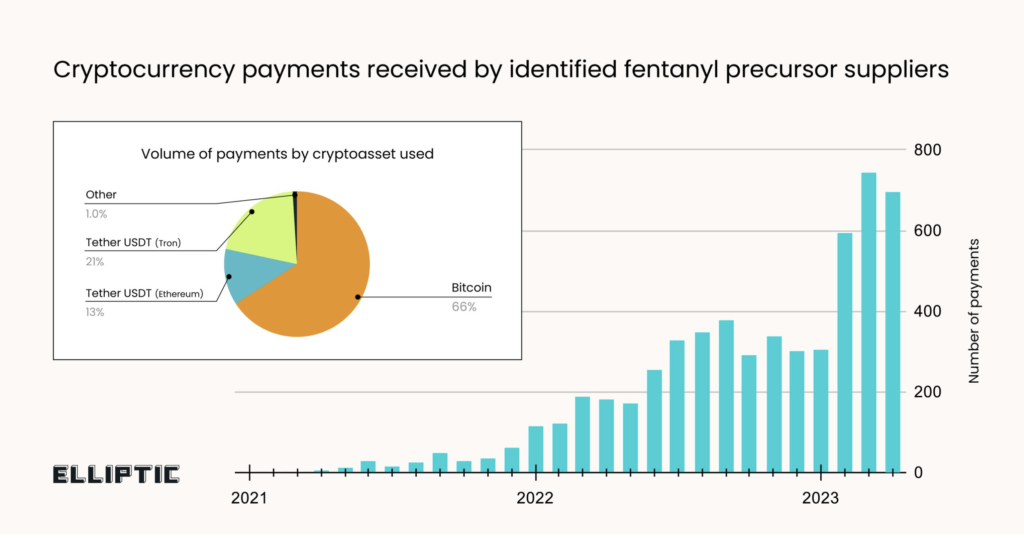Crypto payments to China chemical suppliers fuel US fentanyl epidemic

China-based suppliers of chemicals used solely to produce fentanyl are receiving tens of millions of dollars in cryptocurrency payments, fueling the ongoing fentanyl epidemic in the United States, according to a report by Elliptic.
Research conducted by the analytics firm identified over 90 China-based chemical companies willing to supply fentanyl precursors who altogether had received $27 million in crypto payments — some were ready to sell fentanyl itself, despite China’s regulations banning the export of the deadly drug.
In recent years, Mexican drug cartels have filled the void by manufacturing their own fentanyl using precursor chemicals imported from China.
- To disrupt the financial activities of fentanyl traffickers and their supply networks, the US government has increased its efforts to hold these criminals accountable.
- In April, the US Department of the Treasury sanctioned several individuals and businesses in China for supplying precursor chemicals to Mexican drug cartels.
- The sanctions also exposed cryptocurrency wallets used by these businesses to receive payments.
In talks with these suppliers, the Elliptic research team discovered they had no concerns about the use of the chemicals and openly acknowledged their connection to the production of fentanyl. Other synthetic opioids, even more potent than fentanyl, were also offered for sale, as they remain legal to produce and sell in China. These companies also provided a range of other chemicals used as precursors for synthetic opioids, methamphetamine, and amphetamine.
China-based fentanyl suppliers get paid big in crypto
Elliptic’s research further indicates that a significant portion of these China-based chemical manufacturers accepting orders for fentanyl precursors provided cryptocurrency wallet addresses for payment.
Bitcoin and Tether were the most popular cryptocurrencies used. Elliptic’s blockchain analytics tools have tracked thousands of cryptocurrency payments, totaling over $27 million, to these chemical suppliers. The number of crypto payments to these suppliers has seen a staggering 450% year-on-year increase.
To put the monetary value into perspective, $27 million could purchase enough of the precursor chemicals to produce fentanyl pills with a street value of $54 billion, potentially generating enormous profits for the distributors of the finished product.

Read more: The US dollar isn’t close to losing world reserve currency status to China
Elliptic’s blockchain analytics have also revealed that a known fentanyl trafficker, Alex Peijnenburg, made significant bitcoin payments to one of the precursor suppliers. Peijnenburg was previously sanctioned by US authorities for selling millions of dollars worth of fentanyl and other drugs to US consumers through online stores.
It’s surprising that many of these businesses readily accept cryptocurrency payments. Crypto exchanges are banned in China, and overseas exchanges can’t serve Chinese residents. However, it appears that the majority of the chemical suppliers accepting crypto payments are using accounts at crypto exchanges based outside of China, possibly with the assistance of intermediaries to convert the cryptocurrency into Chinese renminbi. Elliptic’s report mentioned three exchanges were primarily used, but didn’t name them.
This discovery emphasizes the potential for disrupting the trade in fentanyl precursors by targeting the services acting as gateways into and out of cryptocurrencies. Most crypto exchanges now comply with anti-money laundering (AML) regulations and sanctions and employ blockchain monitoring systems to prevent illicit activities.
Elliptic has notified the exchanges involved and has flagged hundreds of crypto addresses in its tools as being linked to this illicit activity. An upcoming report promises to delve into the use of crypto across the fentanyl supply chain – Protos will update this piece when it’s available.
Got a tip? Send us an email or ProtonMail. For more informed news, follow us on Twitter, Instagram, Bluesky, and Google News, or subscribe to our YouTube channel.
